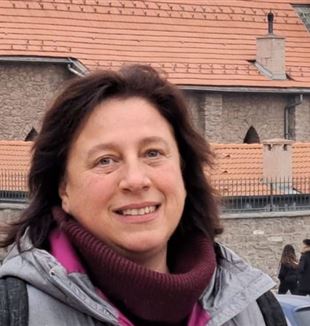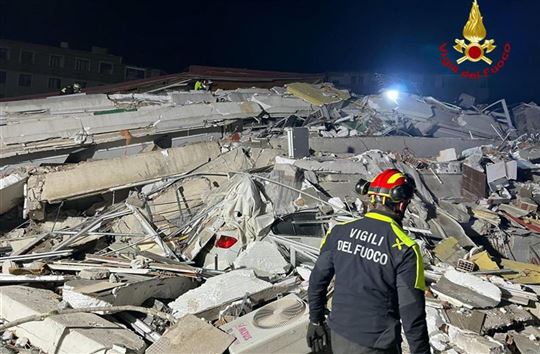
Turkey: "My open questions, amid the rubble"
A missionary for 20 years in Anatolia, Maria Grazia Zambon recounts how she experienced the earthquake, and what she saw happen in the affected areas. "A catastrophe that revealed the truth of the human heart".When the first news of the earthquake began to leak, Maria Grazia Zambon was in Konya, the Turkish city visited by St. Paul, now one of the holy places of the mystical Islam of the dervishes, that was not hit by the tremors. It was one of the lucky areas, and so it took a few hours to realize that more than ten provinces of Turkey have been practically razed to the ground. Maria Grazia grabbed her phone and tried to call her friends in Antioch but got no reply.
She has been a fidei donum missionary from the Diocese of Milan in Turkey for more than 20 years, and has established hundreds of relationships during this time. And she thought of them as the earth began to shake. "In 2001, Cardinal Martini sent me to Antioch, the place where Jesus' disciples were first called Christians," she recalls, "There was a small Christian community there that was very precious because it was a place of dialogue even with Jews and Muslims. I was 35 years old, I did not know the language, I did not know much about those lands, and it was a great and beautiful challenge for me. I stayed in Antioch for seven years, then I spent 13 in Ankara."
The capital is located in the heart of Anatolia and there, she says, the reality she encountered is more complex, more secular and secular. Finally, a year ago, she moved to Konya. Here the parish where she serves is tiny: it has fewer than 40 Christians. They are mostly Africans, Syrians and Iranians, and are migrants who fled the war and are stranded in Turkey because of the infamous deal the EU struck with Erdogan to hold thousands of desperate people inside Turkish borders.
"My first prayer was actually for the migrants, because the area of the camps where they have been living for over eight years was right along the fault line," she says. "The refugee camps were destroyed and we do not even know how many of them died. Official figures these weeks speak of more than 50,000 victims between Syria and Turkey, but they are not included in the count. They are invisible dead. And to think that they were people, families, just waiting to be able to return to Syria or for some humanitarian corridor to be opened to Europe."
Migrants not living in the camps have flocked to the cities, where some state organizations and entities like Caritas are trying to help: "Konya is one of these cities. I live here in the small rectory of the only church there is, I live under the banner of the ‘spirituality of the open door’, based on meeting and listening. I live my life together with Christian refugees, but they are really the last of the last. They are the most angry with Europeans because they feel that they are brothers in faith who are persecuted for religion, and do not find openness."
For this reason, when the indication from the Diocese of Izmir came that a fundraiser should be held in all the parishes to send aid to the earthquake victims, Maria Grazia was hesitant: "Our parish in Konya is the poorest ever, so how could I ask them for anything? Out of obedience that Sunday - there was no priest, we do not have him every week - at the end of the liturgy of the word I pointed to a basket at the bottom of the door. Trembling, I asked if anyone wanted to send something for the earthquake victims. I was ashamed to ask, I just said it in a rush. By evening that basket was full. Days later I learned that our parish was one of the most generous! Think of the human heart. Think of the opportunity! The migrants we do not welcome in Europe are the ones who opened their hearts here, literally giving everything they had. Everything. That is universal brotherhood, nothing to theorize about."
Even her motto, ‘the spirituality of the open door,’ becomes something concrete: "I have been taught this in recent weeks by the many Turkish families who have opened their homes to the displaced, asking nothing in return. I think of a family of friends who are now hosting 10 other people. Economically, people in Turkey are not doing well and yet they share what little they have.”
It is not all easy. The pain, she says, is sharp: "There are wounds that I do not know when they will heal." Her thoughts return to Antioch: "After the first tremors, it was isolated perhaps because of bad weather. So government aid turned to the other cities that were probably easier to reach immediately." News also came in hiccups so "for hours and days we were cut off from the world, until the first friends started to respond from Antioch. They were asking for help, describing the urgencies, the drama of daily life at that time." Where to go? What to do? How to survive? There was a lack of drinking water, shoes, blankets. And then the missing. And the dead.
"I have a friend over there, her name is Fatma," Maria Grazia says again, "As a child she attended catechism with me, now she is 18. She called me terrified because her mother, Maryam, was under the rubble. She asked me for a shovel to dig. You have to imagine that at that time in the city there was no rescue, no means, no nothing. After many phone calls we were able, thanks to the Italian Embassy and the Italian firefighters, to send help." They extracted her six days after the earthquake. She was unrecognizable. The building – which, like most Turkish houses, was heated by natural gas – had caught fire and with it anyone who had been trapped. "Fatma recognized her mother's body from the handbag they found next to her. She opened it, and said she smelled her perfume. She was crying. I was eight hours away by car, so I could not do anything for her but pray."
Read also - "Amid the rubble we are living stones"
Maria Grazia speaks with the confident, matter-of-fact tone of someone who is used to putting her hands to work, little small talk. This time, however, she experiences helplessness. A helplessness that nevertheless allows her to look, as never before, at the Turkish people. "I was surprised by this collective grief that immediately became solidarity," she recounts, "It's amazing for this country. Semi-collapsed churches have taken in displaced people in the rectories, the parish in Mersin has rallied so many people left homeless, but the food to help them comes from the nearby mosque." Religion, sometimes so divisive, is instead a reason for unthinkable unity. "Some of my friends in Konya, who are not Christians, told me that they were impressed by the international help that came before government help (especially from Israel, Italy, Japan). They commented, ‘Those who are not of our faith, our enemies, are helping us generously. How is it possible that they risk their lives for us?’ The earthquake is a catastrophe that laid bare the truth, revealed the truth of the human heart."
Monsignor Paul Bizzeti, Apostolic Vicar of Anatolia and president of Caritas Turkey, said from the start that this could all be an opportunity or a temptation. "I have so many open questions," adds Maria Grazia. "Why did Maryam die? Why are we so fragile? How much longer will the tremors last? How long will it take to rebuild homes and this wounded humanity? I do not have any answers, but I pray that all this will indeed be an occasion and that the Lord will enlighten and guide with His Spirit of Wisdom everyone's future."